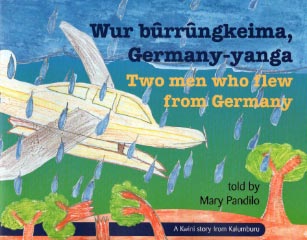In 1932, two German aviators crash landed on a remote part of the north Western Australian coast. Mary Pandilo tells the story of their encounter at Yayirr with her uncle Morrijei. Author Mary Pandilo, also known as Rurruwala, could sing in Kwini, Gaambera, Spanish and Latin. Being 'in Kwini country and eating bush foods inspired Mary to tell the stories and brought back memories of some she had not told in Kwini for years.'
Morrijei was out fishing and found them starving and drinking fluid from the plane’s radiator. ‘If he was wild, he would have killed them but we were already in the mission, and they were quiet.’ Father Thomas writes them a letter, and they are so overjoyed when they return to Germany that they send ‘handkerchiefs, tobacco and all kinds of things’.
Student artists have responded to the story with pictures made with coloured pencil landscape and planes, clouds and lightning. The trees are shown (realistically) sculpted by the high winds of that coast. The pilots are depicted as cheerful blue-uniformed stick figures for the first few pages of the book and then morph into colourful patchwork men with gumboots on. Part family memoir, part history - the illustrations highlight the aspects that young readers will enjoy most.
This is an easy bilingual reader: Kwini language text on the verso of each spread and English on the recto, so that neither language is privileged. Key vocabulary words are set in a text box to the side so children can learn individual words. A verbatim transcription of Mary’s original telling is given in the back of the book, as well as a pronunciation guide.
This told story is archived on tapes T945 and T946 23/6/96 ACELA1426at KLRC in Halls Creek, WA.
Kimberley Languages Resource Centre’s introduction to the book says: 'Language tells us who we are. Language reminds us of our responsibilities within our society and the proper way to do things. Language reminds us of where we have come from. Language makes us feel proud and strong and helps us understand, so we can know.'

